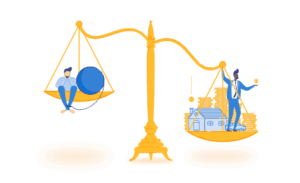Debt makes buying goods and services easier and addresses emergency expenses that require urgent attention. While debt is a useful financial instrument, accumulating too much of it can increase your financial stress as the monthly bills pile up. Some companies aim to reduce your debt and make it more manageable. These companies offer debt settlement and debt relief programs. While these programs can be beneficial, knowing how they work and what to expect is essential to get the best possible results.
Introduction to Debt Settlement and Debt Relief Programs
Debt settlement and debt relief programs strive to reduce the financial burden of a borrower who is stressed about making payments each month. These services primarily cater to people who are having financial difficulties instead of people who have debt but can comfortably pay it off.
What is Debt Relief?
Debt relief involves modifying the current terms of your debt to make the payments more doable. Popular debt relief strategies include securing a lower interest rate for your debt and extending the loan’s term to lower your monthly payments. Some creditors will work with you if you are falling behind because it hurts them more if you stop paying compared to getting on a new payment plan.
How Exactly Does a Debt Relief Program Work?
A debt relief program lets you adjust how you pay off your debt. Lower payments extended over a longer period of time can help you get on top of your finances and rebuild credit. Debt relief companies can negotiate with creditors on your behalf and explore options with you to make financial obligations more manageable.
Legal Protections in Debt Relief
Although debt can increase your financial stress, it is important to know your legal rights so you don’t let a debt collector go too far. These are some of the protections you have:
- The Credit CARD Act: This act places limits on interest rate hikes and prohibits double-cycle billing. Consumers have 21 days of receiving their statement in the mail to pay off the debt on time. The act also limits how many late fees and over-limit fees you can incur.
- The Fair Debt Collection Practices Act: This act makes it illegal for debt collection companies to use abusive and unethical approaches to collect debt from you. Debt collectors cannot contact you from 9 pm to 8 am the following day. Debt collectors cannot contact you at work, and they are required to hang up if you say that now is not a good time to talk. Debt collectors also cannot harass borrowers or use social media to publicize the borrower’s debt. They must contact your attorney and stop communicating with you if you have hired one to represent you.
- Interest Rate Limits: Each state has limits on how much lenders can charge in interest. The maximum interest rate and the penalty for exceeding this rate depend on the state.
The Impact of Debt Relief on Your Credit Score and Finances
A lower credit score makes it more difficult to borrow money in the future and get low interest rates. Most people end up with low credit scores because they fall behind on payments and end up with bad payment histories.
Debt relief allows borrowers to flip the script and rebuild their credit. Turning a $500/mo payment into a $300/mo payment through debt relief makes it easier to stay on top of your bills. You will be more likely to make on-time payments and improve your payment history.
Your payment history makes up 35% of your credit score and is the largest component. A higher credit score can also strengthen your finances by making various expenses more affordable. While a good credit score helps with interest rates, you can also end up with lower insurance premiums and utility payments if you improve your score.
Who Offers Debt Settlement and Debt Relief Programs?
Debt settlement and debt relief programs are readily available for people who want help with making their debt easier to pay off. Here’s what you should know before looking around for help.
What are Debt Relief Companies?
Debt relief companies specialize in negotiating your debt. These companies can assist with debt consolidation and work with lenders to lower your interest rates. Remember, lenders want you to pay on time and may be willing to help you get back on track. That can translate into a lower interest rate, but it depends on the company’s negotiating ability and the creditor’s willingness to adapt.
Debt relief companies handle all of the communication for you and update you on any progress. They take many of the tasks away and give you more time to focus on other areas of your life, such as developing skills that can lead to more income in the future.
Evaluating Debt Relief Companies
Consumers should assess a debt relief company based on its services, online reviews, certifications, and other factors. A debt relief company should be certified by the Financial Counseling Association of America or the National Foundation for Credit Counseling.
Some debt relief companies do not offer debt settlement, a process in which you can pay a lower amount if you have the funds readily available. Before working with a debt relief company, you should consider which services you want.
You should also check if the debt relief company has many years of business experience. More years of experience means the company’s team has navigated more financial hardships from various individuals. They can use this experience to help you secure better terms and lower interest rates.
You should also check how much each debt relief company charges (usually a percentage of debt after they get better terms for you).
Red Flags to Watch Out For
Not all debt relief companies are right for you. Some do not have the necessary services, while others do not serve your best interest. These are some of the warning signs to look for when evaluating debt relief companies:
- No certifications: The debt relief company should have a certification that will increase the likelihood that the company is legitimate.
- Upfront fees: Legitimate debt relief companies only charge after they resolve debt issues. Only fraudulent companies ask for an upfront fee before starting their services or reaching a meaningful result.
- You didn’t initiate the conversation: It’s a good idea to ignore any debt relief companies that reach out to you unwarranted. You should be the first one to start the conversation and let the debt relief company know that you need help.
Cost of Debt Relief Services
Debt relief companies charge a fee equal to the percentage of your settled debt. This fee often ranges from 15% to 25% but depends on the company. If a debt relief company settles $10,000 worth of debt, you may have to pay $1,500 to $2,500 in fees after it’s all said and done. You only incur these fees after the company delivers on its promise. You do not have to pay the company while it performs its services.
The Debt Relief Process
Debt relief can help you get on the right track and strengthen your finances. The entire process consists of five steps.
Step 1: Analysis of Debt
The debt relief company will analyze your debt to assess how it can help. You will have to inform the company of what debt you want to address.
Step 2: Verification of Debt
The debt relief company will check in with creditors to verify the debt. A debt validation letter details how much the borrower owes and when it must be paid.
Step 3: Negotiation
Once the debt relief company has this information, it can proceed to negotiate debt relief or a debt settlement. Debt relief companies with many years of experience have a better perspective on how to handle negotiations. However, smaller companies with good leadership and experienced professionals on their teams can also perform well. However, it takes two sides to negotiate, and the debt relief company will have to get the creditor to reach a bargain.
Step 4: Making a Payment Plan
The debt relief company and the creditor will work together to create a new payment plan. The success of negotiations varies for each creditor, but creditors ultimately do not want to lose payments. Reaching a resolution allows the creditor to recoup some of their losses and possibly recover all of the debt. It is in both parties’ interests to reach an agreement. A new payment plan also makes it easier for borrowers to get back on track.
Step 5: Execution of The Debt Relief Program
The debt relief program then goes through, and the borrower begins to make monthly payments under the new terms. At this point, the debt relief company will ask for a payment for its services. Staying on top of your debt and picking up a side hustle if necessary can ensure that you do not have to use a debt relief company again.
Types of Debt Relief
Two of the most popular types of debt relief are debt settlement and debt relief. Debt settlement involves paying a lump sum that is less than the previously established loan amount to become absolved of the debt. Debt relief involves a more manageable monthly payment plan that can be achieved with debt consolidation.
Bankruptcy is also a type of debt relief, but you should consider all of the other choices first. While debt relief and settlement can help you improve your credit in the long run and regain control over your finances, bankruptcies stay on your credit report for 7-10 years. Bankruptcies also involve expensive legal processes that take up a lot of time. Some debts, like student loans, are not eligible for bankruptcy.
Debt Settlement
Debt settlement is a common path for debt relief. Here’s what you need to know about this option.
What is Debt Settlement?
Debt settlement is the process of agreeing to a lower loan amount. Some creditors would prefer to receive a lower lump sum than risk the borrower lapsing on their debt again. They can generate a return on their new capital, and the borrower gets a fresh start.
Pros and Cons of Debt Settlement
These are some of the advantages and disadvantages of using debt settlement.
Pros:
- Get rid of your debt
- Avoid bankruptcy and debt collectors
- regain control over your finances
Cons:
- High lump sum payment
- Debt relief fees
- Short-term damage to your credit score (but it’s not nearly as bad as bankruptcy)
- The reduced debt gets included in your taxable income if it is $600 or more.
- The debt relief company may request that you stop making payments during the negotiation process, which means more late fees and interest accumulation.
Debt Management
Debt management is a less cumbersome version of debt relief. While anyone can benefit from debt management, it is optimal for people who can rebound and go back to making monthly payments with the right plan.
What is Debt Management?
Debt management involves speaking with a credit counselor and assessing your finances. The counselor can help you establish a payment plan and stay on top of your debt. The counselor may offer recommendations such as using debt consolidation and avoiding any additional loans and lines of credit while paying off your debt.
Pros and Cons of Debt Management
Are you wondering if debt management services are right for you? These are some of the pros and cons.
Pros:
- The fee is much lower
- You can improve your credit score
- Receive personalized guidance from a credit counselor
Cons:
- You don’t have a team behind you. It’s all on you.
- You may have to avoid incurring additional debt to stick to the plan
- You still have to pay your debt instead of waiting to see what a debt relief company will do
Factors to Consider When Choosing a Debt Relief Option
Consumers can choose from many debt relief options. These are some of the factors you should keep in mind before making that important decision.
Understanding Your Financial Situation
Knowing your financial situation can help you decide which debt relief option is right for you. Borrowers who are pessimistic about their ability to repay debt as it is may want to opt for debt settlement. It’s the last line of defense before filing for bankruptcy.
Borrowers who could keep up with the monthly payments if they were a few hundred dollars less each month may want to opt for debt relief or debt management. Both approaches involve staying on top of your debt and reducing your monthly payments through a new agreement of debt consolidation. If you are barely missing your payments, debt management may be the better choice since it is more affordable. A good credit counselor can help some borrowers stay on top of their finances.
It is also a good idea to consider the type of relationships you have with your creditor and how that creditor has handled past issues with other clients. If your creditor does not negotiate, then debt will continue to pile up due to late fees and interest accumulation. Debt management can be a good approach in this scenario and help you build momentum. However, if you do not believe you can pay off the debt, a settlement may be better.
Type of Debts You Owe
The type of debt you owe impacts your debt relief options. Some types of debt are more difficult to get relief from than others. For instance, you cannot get rid of student loans through bankruptcy. If that is your main debt, you should consider another route, like debt relief or debt management.
You can walk away from most debt during bankruptcy. Debt with this distinction gives the lenders more incentive to reach an agreement with the debt relief company representing their borrowers.
Borrowers should assess all of their debt and determine which financial obligations they can stay on top of. Working on some of your monthly loan payments while a debt relief company negotiates with some of your creditors can help you minimize your financial burden while receiving help.
Your Credit Score and History
A high credit score makes it easier to get financing and obtain a loan for debt consolidation. People with good credit scores can more easily pursue this route and reduce their monthly payments through a longer term.
Consumers with lower credit scores may not have this option. If they can get a debt consolidation loan, they may have to settle for a higher interest rate. However, the higher interest rate can be worth it if you end up with lower monthly payments through an extended loan.
Consumers with good credit scores may want to preserve their scores during the process. Filing for bankruptcy will devastate any good credit score, and it can take several years to recover from that event. Consumers with good credit scores will put in more effort to avoid bankruptcy. Debt settlement will also hurt your credit score in the short run but is easier to recover from.
It is also important to consider if you need a good credit score for any upcoming purchases. A high credit score is less valuable if you already own a home and a car. However, a high credit score is critical for anyone who plans to take out a mortgage or an auto loan in the near future.
Long Term Implications
Each debt relief option has long-term impacts on your financial health and credit. Debt settlement and bankruptcy will both hurt your credit score, and it can take many years to recover from the latter. Both of these strategies allow you to walk away with a fresh start, but they involve considerable expenses. Bankruptcy, in particular, is quite expensive due to the legal fees associated with the procedure.
Debt relief via consolidation and management can take longer and require you to take a more active role in your financial recovery. You will have to make monthly payments under a new plan and stay on top of your finances. A credit counselor will guide you on best practices, such as not taking out any new loans or lines of credit. While many people know how to avoid extra debt during the process, having a mentor who keeps you accountable can help you stick to the best practices and effective money habits.
Conclusion: Is It a Good Idea to Get Debt Relief?
Debt relief can help you recover your finances and get back on the right track. Debt management and consolidation can lead to meaningful improvements in your budget and credit score. Debt settlement and bankruptcy both offer a fresh start but are more tedious. Bankruptcy, in particular, is quite expensive.
One of the risks with debt relief is that a company cannot successfully negotiate with the creditor. In some cases, the debt relief company doesn’t have the right professionals to handle the negotiations. However, negotiations can also fall apart because a creditor does not want to negotiate.
Even if a debt relief company is negotiating on your behalf, the lender will continue to tack on extra expenses like late fees and interest. During the process, the debt relief company will advise that you do not pay your debt. Making monthly payments can hurt the debt relief company’s ability to negotiate better terms. While this is true, it also means you will be stuck with more debt if the negotiations fall apart.
Debt relief services are not for everyone. They can have a meaningful impact on your finances and give you a fresh start. Many consumers have benefitted from debt relief companies. It’s easier for many people to have one of these companies negotiate with a creditor than doing it themselves. However, it is important to consider the risks of the negotiations falling through and resulting in extra debt. Consider if you are able to do an extra side hustle or develop a skillset to land a higher-paying job. Those two initiatives can increase the likelihood of never falling behind on debt in the future.









